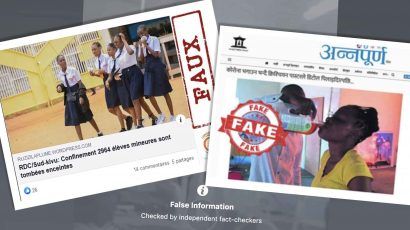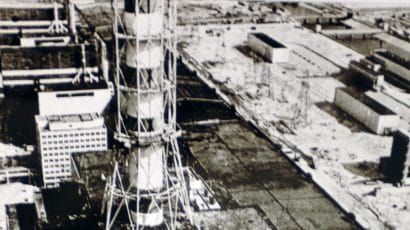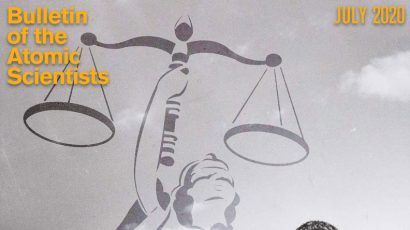Search results for nuclear terrorism
In 1960 Matthew Meselson, a newly-minted assistant professor of Biochemistry and Molecular Biology at Harvard University, spent the summer at the Arms Control and Disarmament Agency in Washington, DC, a US government funded independent organization that worked on non-proliferation issues (Klotz and Sylvester 2009). Paul Doty, a long-time advisor to the government on nuclear-weapons disarmament … Continued
A cascading catastrophe: The drone threat to critical infrastructure
As drones become cheaper and more capable tools for terrorists, the risks they pose to critical infrastructure is growing. Has the US government thought enough about how to defend the electric grid and other important infrastructure from attack?
Israel to perform at Eurovision. Expect protests, machine guns, and drones
As the death toll and destruction in Gaza continues, Malmö is bracing for protests ahead of Israel's Eurovision performance on Thursday.
Aceptemos la realidad: un enfoque pragmático sobre Pyongyang
Ahora que Corea del Norte llevó a cabo su cuarto ensayo nuclear en enero, la península coreana parece estar más lejos que nunca de la desnuclearización. Dada esta realidad, ¿cuál es la forma más eficaz de abordar el problema nuclear? Los obstáculos para los avances son enormes. Las inclinaciones de Pyongyang son sumamente realistas, y … Continued
Profiting from panic: the bizarre bogus cures and scams of the coronavirus era
The desperation many people have for a cure or treatment for COVID-19 is understandable. But the fake cures and scams circulating online are a real problem.
A jet ski vacation during the coronavirus lockdown? Online liars want to make you mad at politicians
Politicians will likely continue to be the target of COVID-19-related misinformation, victims of the so-called information pandemic, or infodemic, that has spread as far and wide as the coronavirus itself and shows no signs of abating any time soon.
2018 Doomsday Clock Statement
Overview Current Time FAQ Timeline Dashboard Multimedia Exhibit Full Statement It is now two minutes to midnight 2018 Doomsday Clock Statement Science and Security Board Bulletin of the Atomic Scientists Editor, John Mecklin Statement from the President and CEO The year just past proved perilous and chaotic, a year in which many of the … Continued
Philipp C. Bleek
Philipp C. Bleek is Associate Professor of Nonproliferation and Terrorism Studies, Fellow at both the James Martin Center for Nonproliferation Studies and Center on Terrorism, Extremism, and Counterterrorism, and Coordinator at the Cyber Collaborative, all at the Middlebury Institute of International Studies at Monterey. He works on the causes, consequences, and amelioration of chemical, biological, … Continued
Giovana Rodrigues Manfrin
Giovana Rodrigues Manfrin is a Master of Arts Candidate in Nonproliferation and Terrorism Studies at the Middlebury Institute of International Studies and a Marie Sklodowska-Curie Fellow with the International Atomic Energy Agency (IAEA). At MIIS, she focuses on nuclear nonproliferation, counter proliferation financing, and nuclear-cyber security. Prior to MIIS, Giovana was a Research Fellow on … Continued
Fact-checking networks fight coronavirus infodemic
Fact-checking websites now exist around the world. These organizations, some grassroots, others connected to larger media companies, have been helping to tamp down on the spread of coronavirus misinformation.
2018 Doomsday Clock Statement
It is now two minutes to midnight 2018 Doomsday Clock StatementScience and Security Board Bulletin of the Atomic Scientists Editor, John Mecklin From the President | Full Statement | Board Biographies | About the Bulletin | Clock Timeline | Download PDF version Statement from the President and CEO The year just past proved perilous … Continued
Time for India and Pakistan to resolve their own crises
For nearly two decades, India and Pakistan have lived constantly under the shadow of nuclear war. In 1999, within a year of becoming nuclear-armed, the two states were embroiled in the Kargil crisis, a conventional conflict in which a limited nuclear exchange seemed a real and very threatening possibility. Each crisis since Kargil has raised … Continued
Chernobyl 25 years later: Many lessons learned
From the Archive: 1945-2019 Subscribers can read every back issue of the Bulletin. Visit the archive Subscribe now! Get the Bulletin’s digital magazine and access to the archive for less than $5 a month This is a free preview of a premium article published in March 2011. Subscribe now to access our full archive. By … Continued
Bulletin of the Atomic Scientists Announces Leadership Changes to Governing Board, Board of Sponsors, and Science and Security Board
For immediate release: March 9, 2016 Bulletin Media Contact: Janice Sinclaire, [email protected] CHICAGO– March 9, 2016 – The Bulletin of the Atomic Scientists has announced that Ambassador Thomas R. Pickering is being honored with a place on the organization’s Board of Sponsors, where he joins 16 Nobel Laureates and other eminent leaders who act as … Continued
La participación de Estados Unidos es fundamental para el control de armas en Asia Meridional
Debido a la nuclearización de Asia Meridional, el conflicto indio-pakistaní dejó de ser una cuestión regional para convertirse en un problema global. Un intercambio de 100 armas nucleares entre las dos naciones podría matar a 20 millones de personas en el plazo de una semana, así como reducir la temperatura global en 1,3 grados centígrados, … Continued
Es hora de que India y Pakistán solucionen sus propias crisis
Desde hace casi dos décadas India y Pakistán viven continuamente bajo la sombra de una guerra nuclear. En 1999, dentro del año de desarrollar armas nucleares, los dos Estados se vieron envueltos en la crisis de Kargil, un conflicto convencional en el que un ataque nuclear limitado pareció ser una posibilidad real y muy amenazadora. … Continued
Magazine
July 2020 Cover design by Thomas Gaulkin. In this issue, we focus on the undeniable physical impacts of a changing climate and why that physical evidence can’t reasonably be explained, except as a result of warming caused by greenhouse gas emissions. Features Why the atomic bombing of Hiroshima would be illegal today By Katherine … Continued
India and Pakistan: Very far from Kansas
The United States does not enjoy the same leverage over Pakistan that it once did. Washington never had much leverage over India. So my roundtable colleague Mario Carranza's idea that Washington can "force" New Delhi and Islamabad to "stop their nuclear arms race and take arms control seriously"—even as the United States modernizes its own … Continued
US involvement is critical for South Asian arms control
South Asia's nuclearization has transformed the Indo-Pakistani conflict from a regional matter into a global issue. An exchange of 100 nuclear weapons between the two nations could kill 20 million people within a week and could also reduce global temperatures by 1.3 degrees Celsius, putting up to 2 billion additional people at risk of famine. … Continued
Buenas razones para preocuparse
Después del accidente ocurrido en la central nuclear de Fukushima Daiichi, muchos observadores esperaban que los países que buscaban establecer sectores de energía nuclear, o ampliar los existentes, se preguntaran principalmente sobre este tema: ¿Qué tan segura es la energía nuclear? Por el contrario, muchos países en vías de desarrollo siguen afirmando que la energía … Continued










